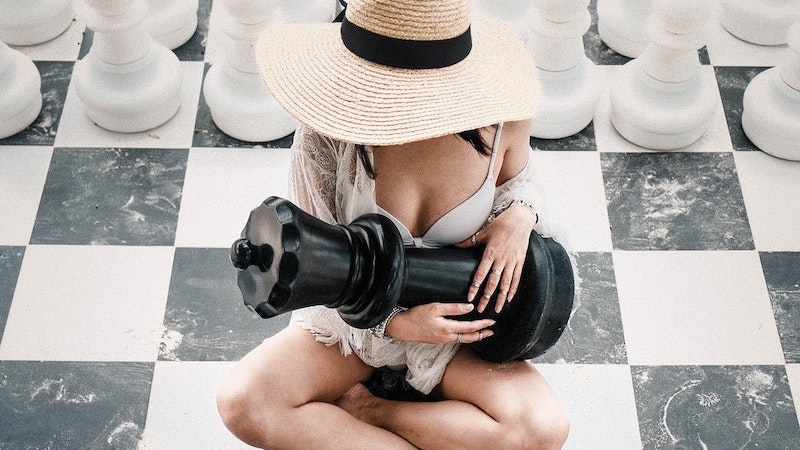Unconditional love – there are no other moves in the game
- 27 February 2021
- Posted by: Michael H Hallett
- Category: Emotional principles ,

I love this photo by Minh Pham of a lady on a giant chessboard clutching the queen. The queen is, well, the queen of the chessboard. She rules the roost. While the sceptre represents the king, the heart represents the queen—the symbol of love. For me, the queen’s unlimited movement across the chessboard represents her capacity for unlimited and unconditional love.
When it comes to healing trauma, move the queen. Use unconditional love. There are no other moves in the game.
What is unconditional love?
The Healthline website has a beautiful definition of unconditional love:
“Unconditional love, simply put, is love without strings attached. It’s love you offer freely. You don’t base it on what someone does for you in return. You simply love them and want nothing more…”
We all like to think that we bear such love for our nearest and dearest, perhaps even for the whole of humanity. Yet the reality, for most of us, is starkly different. If someone does something that upsets us—triggers us emotionally—we bite. Angry words spill from our mouths: “What’s wrong with you? Why did you do that?”
At the 2021 Intergenerational Trauma Conference, in his moving keynote speech on racial trauma, Professor Kenneth V. Hardy spoke of a trauma-informed shift from “what’s wrong with you?” to “what happened to you?”
This is the shift from conditional to unconditional love.
When we recognise that we’re all living in a trauma-based society, that we’re all traumatised to some extent, and that our traumas can be triggered by anything, we can make this shift.
After all, most of us don’t intentionally set out to be harmful. It’s either accidental, or we’re responding from a hurt place to some event that happened long ago—perhaps not even in our own lifetime.
The ‘empathic other’
Peter Levine notes that “trauma isn’t just what happened, but what happened in the absence of an empathic other.” No one was there to hold us through the traumatic event—physically or emotionally—so we could process it. We had to cling tightly to ourselves to prevent disintegration—and in the process incurred a trauma.
These traumatised parts of us are quite literally frozen in time. This is true whether they happened earlier in our lives or we inherit them. In Trauma exists as a series of ripples I describe the different sources of personal and collective trauma. These are generational trauma (recent ancestors), community, racial and ancestral(remote ancestors) trauma.
Judith Prager, author of The Worst is Over, a guide to talking to people in shock, speaks of being the ‘empathic other’. Empathising with another’s trauma gives them permission to experience the frozen, unprocessed pain. Empathy leads to presence. It makes what happened in the past present and releases it.
Listening to hear
Listening is one of the empathic other’s key skills.
In The 7 Habits of Highly Effective People, Stephen R. Covey writes: “Most people do not listen with the intent to understand; they listen with the intent to reply.”
In Do you listen to hear, or listen to respond? I look at the behaviours associated with these two modes of listening:
“When others are speaking, do you feel a rush to jump in? Are you looking for gaps in the conversation where you can, reasonable politely, take over? Is a narrative writing itself in your head and wanting to burst from your mouth? Is there something vaguely churning in the pit of your stomach? That’s all listening to respond.”
Conversely, “Listening to hear requires discipline—the discipline of silence, which our society is on the whole very poor at. Listening to hear means creating a safe space where the talker feels comfortable sharing as much as they are willing to.”
Neuropsychologist Leo Shea III writes: “When you sit down with someone who has been traumatised, know that you are entering hallowed space. Know that you are being invited into a person’s private sanctuary. Embrace that space with reverence.”
When it comes to healing trauma, move the queen. Use unconditional love. There are no other moves in the game.
